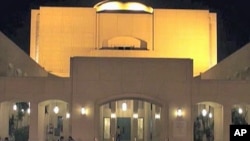Late 18th century European opera may seem an odd choice of entertainment for modern, Arab audiences. But art is art... or at least that is the message of a group of Egyptian singers staging Amadeus Mozart's The Magic Flute in January.
Those involved in the project gathered recently at a small Cairo apartment to go over details of transforming The Magic Flute for its debut at the Library of Alexandria, a symbol of renewed Egyptian culture.
Producer Neveen Allouba said, "The way the idea of doing The Magic Flute in Arabic in Alexandria is that Raouf Ashraf and I were singing at the New Year's concert last New Year, 2009, and Raouf was actually singing the Papageno aria basically in German, but then we decided he do one of the verses in the classical Arabic version translation of Dr. Aly Sadek."
Sarah Enany worked with Allouba translating and adapting the 18th century libretto. "But what really amazed me, I mean, when Neveen decided doing it in Egyptian Arabic, I thought that was amazing, the most amazing idea ever."
"And Papageno, especially, and Pamina and Monostatos, all the main characters in the opera, are so simple," said Allouba. "And they spoke very cute German. Their German was easy."
Pagageno is being performed by Raouf Zaidan. "I remember something very distinctly, you said, Sarah, at the beginning when we were working, you said, 'This is legitimizing our language.' And I just loved that thought because when I go down to the souk and I buy tomatoes and things and I hear the people talking. I love this language. It feels like a language we kind of, you know, yes, we talk it, but it is a little bit we want to use it when we're buying tomatoes and things. But it is, as you say, a living language. And I love what you said, by doing this, we're bringing to that language the respect and the importance that it has," said Allouba.
"The division of art into high and low and the idea of culture with a capital "C" is something that has alienated and still does alienate a lot of people," said Enany.
"I mean, until now, in the main hall of the Cairo Opera House, audience members, male audience members, there's a dress code. You cannot come in unless you're wearing a suit and tie, which immediately alienates a lot of the population that does not even own a suit and tie. We are not an economically rich country. So when you then put in this language barrier, I mean, opera, when Neveen said making opera more accessible, I think this is such an important thing."
"It's a point that Ashraf Sewailm, who plays the part of Sarastro, says has wide implications. "It wouldn't have to be Western opera. At all. It would just need to be good art, performing arts for the people can go and drink from, and feed and water their souls with. Art is not elitist... the poorest of people are trying to accessorize, let me put it this way.
"Not very successfully. And with the new over-Islamicization, the zealous religious culture that's taking over our country, you still find people who are trying to be as strict as possible, still trying to find beauty and entertainment in their lives. So you see girls who are wearing the hijab or even the niqab and wearing some crazy colors that are mismatched. They have a need to express beauty and have it come into their lives."




